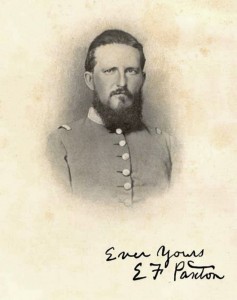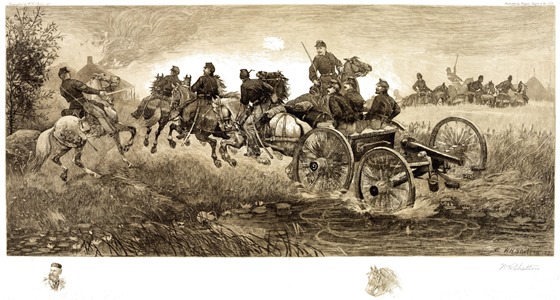May 3d. Commences with clear and pleasant weather; inspected crew at quarters, and performed Divine service at ten o’clock, this morning, on quarter-deck. While at service the gunboats Albatross, Estrella, and Arizona got under way and started up Red river on a reconnoissance,—the little Albatross taking the lead.
Friday, May 3, 2013
Sunday, 3d.—Started at daylight; got within one mile of Big Black River and met wagons and artillery coming back. Grand Gulf evacuated; falling back towards Vicksburg and Jackson; started back at 5 P. M. ; marched until 3 A. M. Cannonading towards Vicksburg; are marching in direction of railroad bridge, across Big Black River.
Near Black River, Sunday, May 3. Arose at 2 A. M. and as soon as practicable hitched up with one day’s shelled corn in our bags. Did not leave until sunrise. Crossed a small stream on a chain-suspended bridge which the rebs had set afire, but was saved. Our way was disputed about a mile on by a rebel battery which threw shells at the advance, which formed line and moved on. At 10 A. M. the skirmishers were hotly engaged and sent back for a howitzer. The third (with which I was connected) piece moved out on a trot, took a position by direction of Colonel Powell within 200 yards of their sharpshooters, who were firing briskly in a thick wood. Opened on them with canister, which soon had the desired effect of “drying them up there.” Advanced to the left a few rods and opened fire on a log house where the sharpshooters were working. Threw three shells, then retired to await orders, having shot ten rounds in all, four spherical case, three canister, three percussion shells. The litter-bearers report a rebel captain killed in front of the piece by canister cutting him nearly in two. In the meantime the 1st and 5th pieces took position on the right to prevent three pieces of artillery from taking position. Advanced about two miles when their pieces opened fire with shells on us. The howitzers went forward but were ordered back by Chief of Artillery, and two ten-pound Parrotts instead. A brisk firing on both sides for ten or fifteen minutes. The 1st Brigade in line on right, 2nd on left, when they pulled up stake and we marched without molestation within a mile of Black River; went into park. All very tired and needed rest. Passed about seventy-five prisoners during the day, many more being taken by Logan on the left. Pickets firing often during the night, once with artillery.
 Telegram
Telegram
May 3,1863.
The enemy was dislodged from all his positions around Chancellorsville and driven back towards the Rappahannock, over which he is now retreating. We have to thank Almighty God for a great victory. I regret to state that Gen’l Paxton was killed, Gen’l Jackson severely and Gen’l Heath and D. H. Hill slightly wounded.
(Signed) R. E. Lee,
Gen’l Commdg.
Sunday, 3d—News came that our army took five hundred prisoners at Grand Gulf. General Steele’s Division passed here today. There is an Iowa brigade in it, consisting of the Fourth, Twenty-sixth, Thirtieth and Thirty-first Infantry. The men all look fine and there are none from the brigade in the hospital.
May 3 — About thirty of us members of the battery went to Harrisonburg to-day and attended the burial of a member of our company who died in the hospital at Harrisonburg.
3d May (Sunday).—I paid a long visit this morning to Mr Lynn the British Consul, who told me that he had great difficulty in communicating with the outer world, and had seen no British man-of-war since the Immortalité.
At 1.30 I saw Pyron’s regiment embark for Niblitt’s Bluff to meet Banks. This corps is now dismounted cavalry, and the procession was a droll one. First came eight or ten instruments braying discordantly, then an enormous Confederate flag, followed by about four hundred men moving by fours—dressed in every variety of costume, and armed with every variety of weapon; about sixty had Enfield rifles; the remainder carried shot-guns (fowling-pieces), carbines, or long rifles of a peculiar and antiquated manufacture. None had swords or bayonets—all had six-shooters and bowie knives. The men were a fine, determined-looking lot; and I saw amongst them a short stout boy of fourteen who had served through the Arizona campaign. I saw many of the soldiers take off their hats to the French priests, who seemed much respected in Galveston. This regiment is considered down here to be a very good one, and its colonel is spoken of as one of the bravest officers in the army. The regiment was to be harangued by Old Houston before it embarked.[1]
In getting into the cars to return to Houston I was nearly forced to step over the dead body of the horse shot by the soldier yesterday, and which the authorities had not thought necessary to remove.
I got back to General Scurry’s house at Houston at 4.30 P.m. The general took me out for a drive in his ambulance, and I saw innumerable negroes and negresses parading about the streets in the most outrageously grand costumes—silks, satins, crinolines, hats with feathers, lace mantles, &c, forming an absurd contrast to the simple dresses of their mistresses. Many were driving about in their masters’ carriages, or riding on horses which are often lent to them on Sunday afternoons; all seemed intensely happy and satisfied with themselves.
—— told me that old Sam Houston lived for several years amongst the Cherokee Indians, who used to call him “the Raven” or the “Big Drunk.” He married an Indian squaw when he was with them.
Colonel Ives, aide-de-camp to the President, has just arrived from Richmond, and he seems a very well-informed and agreeable man.
I have settled to take the route to Shrieveport tomorrow, as it seems doubtful whether Alexandria will or will not fall.
[1] At the outbreak of the war it was found very difficult to raise infantry in Texas, as no Texan walks a yard if he can help it. Many mounted regiments were therefore organised, and afterwards dismounted.
Sunday, 3rd. Wet and muddy, disagreeable. Went to Post Commissary and drew rations, 948. Issued to the men in the P. M. Mr. Brown came, bringing the mail. Two letters for me, one from Fannie and one from home. Both did me much good. Fixed up our oilcloth as a tent. Thought it very nice. At dark a thunderstorm arose. Had a candle to read by. Soon discovered a stream ran through the tent. Blankets wet—soaked and half suffocated. Rebels gone to Traversville.
Sunday, 3rd—I went on by Duke’s and to Squire Bennett’s on Buffalo Creek. Took dinner and remained till near night. Then crossed the pike at Hogg’s Store and up to Billy West’s and spent the night.
Summary: Print shows cavalry and horse artillery troops at the Battle of Chancellorsville, Virginia, May 3, 1863. Includes men riding on a caisson towing a small cannon, a building on fire, and additional cavalry headed into action in the background. With two remarques, lower left, self-portrait of the artist; lower right, the head of a horse.
Artist: William Henry Shelton (1) (2); New York : Published by Bryan, Taylor, & Co., c1887 Sept. 15; Note from publisher states: Published for the artist by Bryan, Taylor & Co., N.Y. Limited to 750 copies.
Library of Congress image.










